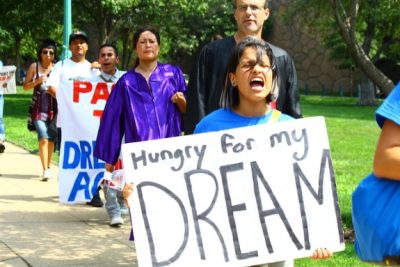Immigration at the Border

50 States Work on Immigration Legislation While Congress Refuses to Act
The National Conference of State Legislatures (NCSL) recently released an analysis of the number of immigration-related proposals introduced at the state level between January and June of 2011. NCSL found that more immigration-related bills (1,592) were introduced in the first half of 2011 than in the same time period in 2010 (1,374). While the bills weren’t all bad—representing both a mixed bag of punitive and progressive proposals—they tell a bigger story of 50 states grappling with a broken immigration system while Congress sits back and watches. Read More

Immigration Restrictionists Take SB 1070 to Supreme Court
More than a year after SB 1070 was initially enjoined in federal court, the immigration restrictionists behind Arizona’s misguided immigration law have brought their case to the Supreme Court. Proponents of SB 1070 are likely to hail the state’s petition, filed yesterday, as not only the first step toward reversing the injunction against the law’s most punitive provisions, but toward cementing states’ role as the primary enforcers of federal immigration law. While we won’t know whether the Justices will even hear the case until at least October, the petition already foretells an uphill climb for Paul Clement, the attorney representing Arizona and former Solicitor General under President Bush, to persuade the Court to overturn long established principles. Read More

ICE Clears Itself of Misconduct in Internal Investigation, Draws Ire from Immigrant Rights Groups
As if immigrant rights groups needed another reason to distrust the Department of Homeland Security (DHS) this week, Immigration and Customs Enforcement (ICE) cleared its agents of any wrongdoing in a recent internal investigation into reports of abuse. Earlier this year, ICE sparked controversy when federal agents allegedly followed immigrant parents to and from a Detroit elementary school as they dropped off their children, trapping the parents inside the school. After residents, advocates and state officials accused ICE of violating their own enforcement policies, ICE officials—including director John Morton—promised to investigate the matter. The results of that investigation, however, have left local community groups outraged and fearful of whether ICE is capable of holding itself accountable in the future. Read More

What’s the Value of Keeping Undocumented Youth in the Shadows?
The real life psychological ramifications of young immigrants struggling with their unauthorized status are often glossed over in the larger immigration debate. In a recent journal article, Learning to Be Illegal: Undocumented Youth and Shifting Legal Contexts in the Transition to Adulthood, University of Chicago professor Roberto G. Gonzales uses 150 interviews with young Latino adults to examine how unauthorized youth deal with their legal status as they come of age. Gonzales finds that as unauthorized immigrant children transition into adulthood, many “learn to be illegal,” figuring out how to exist in a society that was once welcoming, but now prohibits their participation. Read More

DHS Terminates Secure Communities Agreements with States, Continues to Implement Program
Late Friday afternoon, the Department of Homeland Security (DHS) provoked outrage from immigration groups when it announced the termination of Secure Communities Memorandum of Agreements (MOAs) with state and local governments. DHS initially entered into MOAs with state officials as a way to encourage voluntary participation in Secure Communities, an enforcement program which runs the fingerprints of individuals booked in local jails through federal databases. Last October, however, following attempts by local jurisdictions to terminate their MOAs, DHS Secretary Janet Napolitano announced that Secure Communities was not a voluntary program after all. DHS’s latest about-face this week has only further angered immigration activists, many of whom are calling on DHS to end the program. Read More

Time to Tackle Immigration Now that the Border is More “Secure” Than Ever, Report Says
The U.S.-Mexico border isn’t what it used to be. That is the over-arching theme of a new report from the Center for American Progress (CAP), entitled Safer than Ever. The report describes the immense buildup in enforcement resources which has occurred along the U.S.-Mexico border since 1993. This buildup has created “a border where the vast majority of attempted entries are identified and a far larger percentage of entrants are apprehended than ever before.” Moreover, the increase in border enforcement has coincided with falling rates of violent crime along the border, and—over the past few years—a dramatic decline in the number of unauthorized immigrants attempting to cross into the United States. In other words, border enforcement is at an historic high and unauthorized immigration is at an historic low. This creates, as the CAP report puts it, “a unique opportunity” to redesign the broken U.S. immigration system and finally confront the fact that 11 million unauthorized immigrants now call the United States home. Read More

Washington Farmers Fear Economic Impact of National E-Verify Bill
Much like farmers in Georgia who are experiencing labor shortages due to HB 87—the state’s new immigration law which mandates use of E-Verify—growers in Washington state fear that a similar, national E-Verify bill will have a devastating economic impact on the state’s agricultural workforce. This week, the Washington Growers League said that a national E-Verify law would prohibit many of the state’s current farm workers from harvesting crops, which would in turn devastate the industry, slashing production and forcing consumers to buy produce out of state. Rep. Lamar Smith (R-TX) introduced the mandatory E-Verify bill (the Legal Workforce Act or H.R. 2164) back in June. Read More

Department of Justice Seeks Injunction Against Alabama’s Anti-Immigrant Law
Yesterday, the Department of Justice (DOJ) filed yet another lawsuit against extreme state-level immigration laws—this time against Alabama’s HB 56. Already the subject of a class action lawsuit filed by the ACLU and other immigrants’ rights groups, Alabama’s HB 56 would require local law enforcement to verify the immigration status of those stopped for traffic violations, public schools to determine the immigration status of students, employers to use E-Verify and makes it a crime to knowingly rent to, transport or harbor undocumented immigrants. In its motion for a preliminary injunction, however, the DOJ argues that Alabama’s law, much like Arizona’s, interferes with the federal enforcement of immigration laws and places undue burdens on local schools and federal agencies. Alabama’s law was signed into law by Governor Robert Bentley in June and slated to take effect September 1. Read More

American Immigration Council Applauds DOJ for Responding to Alabama’s Punitive Anti-Immigrant Law
Washington, D.C. – On Monday, the Department of Justice filed suit against the state of Alabama to block the implementation of HB 56, which is set to take effect September 1. HB 56 is similar to but far more punitive than Arizona’s SB 1070. The law includes provisions that… Read More

Immigration Case Backlog Reaches All-Time High, Report Shows
As the U.S. continues to pour money into immigration enforcement and detention, the resources necessary for the immigration court system to keep up with enforcement have not been appropriated. In fact, a record number of immigration cases—275,316 as of May 2011—are in the Immigration Court backlog according to a recent report by the Transactional Records Access Clearinghouse (TRAC). In four months, the case backlog grew 2.8%, and it has grown 48% since FY2008. Read More
Make a contribution
Make a direct impact on the lives of immigrants.
